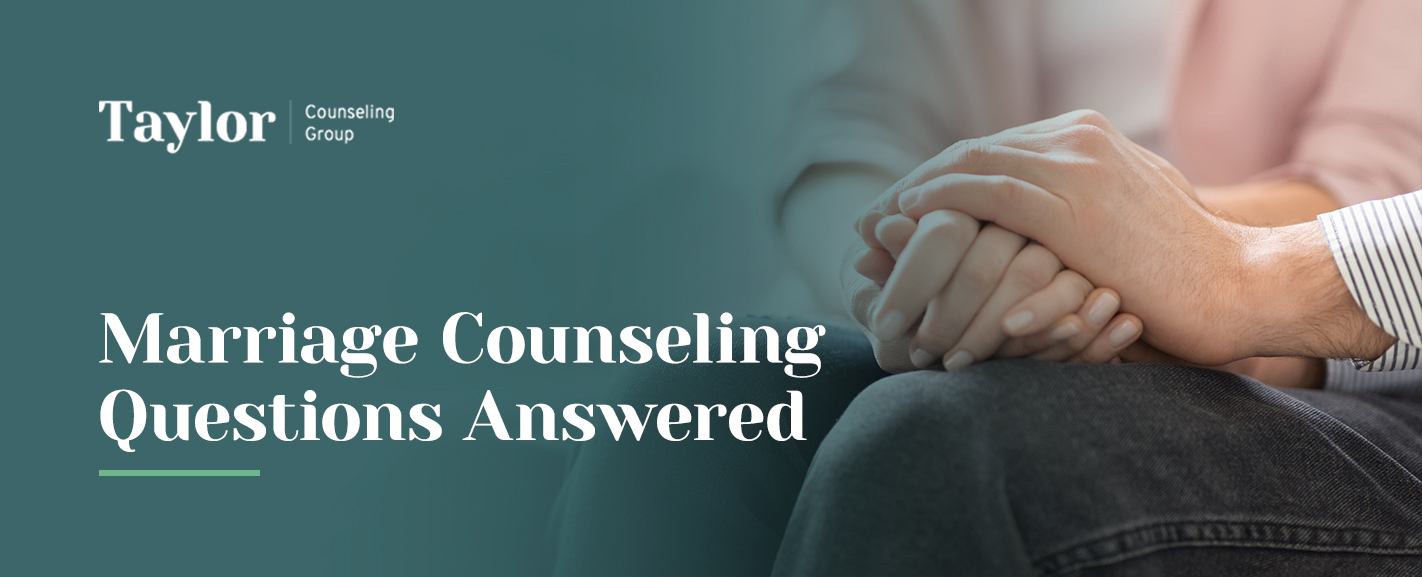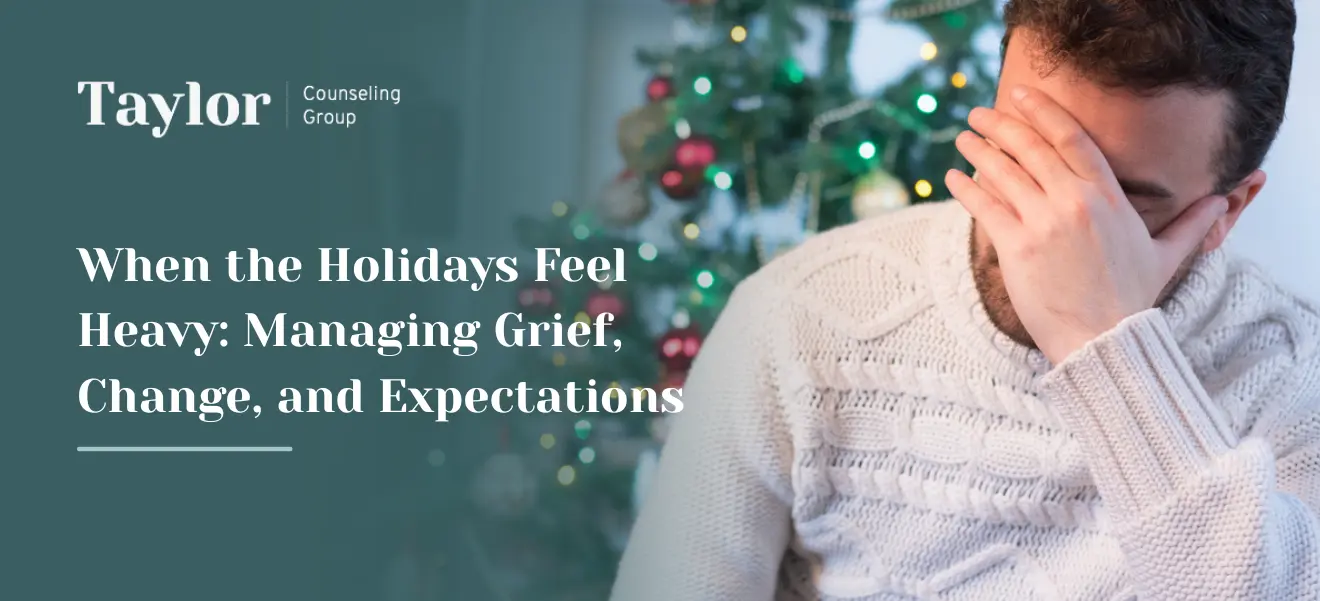Marriage is hard work for nearly everyone who commits to a lifetime with a partner. Marriage takes communication and compromise, but life can easily get in the way. Work schedules, kids, social obligations, and everything else that contributes to a full life can be both a joy and a challenge for a marriage.
Some may still perceive marriage counseling as a taboo subject. But marriage counseling can be the right fit for any couple that wants to learn ways to effectively communicate and enrich their relationship. To help you as you consider marriage counseling, we have the answers to some of your biggest questions.
When to Seek Marriage Counseling — Is It Too Soon?
When to start marriage counseling is always up to the couple. It is never too soon. In fact, some therapists specialize in premarital counseling, which can help prepare couples for the commitment of marriage. Some of the common reasons married couples decide to try counseling include:
- Communication issues: Effective communication is the foundation of a solid marriage, but finding the right way to communicate can be tough. If you feel like you aren’t being heard or you and your partner keep having the same argument over and over again, counseling can help both of you find productive ways to talk through those issues.
- Lack of connection: Over time, partners can feel as if they have drifted away from one another. Whether this happens slowly over the course of time or because of a significant life transition, like having children, it can feel difficult to bridge that gap and find each other again. Counseling can give you and your partner the time and tools to reconnect.
- Financial disagreements: Money is at the center of disagreements for many married couples. Counseling can help you communicate effectively about financial matters and work to compromise where needed.
- Sexual needs: Sex is an important element in many people’s marriages. If one or both of you feel that your needs are not being met, the rest of your relationship can be negatively impacted. Counseling can help couples openly discuss their sexual needs and find a way to move forward.
- Infidelity: A relationship can fall apart if one or both partners are unfaithful. Whether you and your partner want to rebuild the relationship or find a way to end it amicably, counseling can be an effective tool.
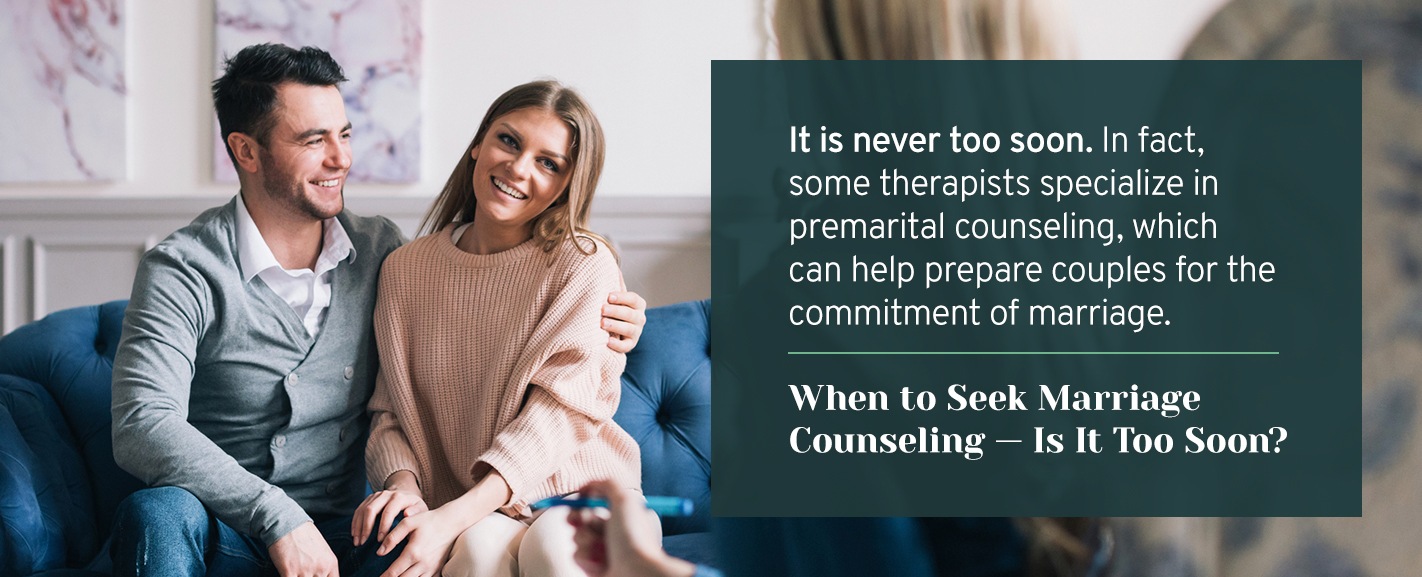
Is It OK to Go to Marriage Counseling Alone?
Marriage counseling sounds like it is built for two, but you can still go on your own. If you are concerned about your relationship but your partner is unwilling to try counseling, you can still find value in working with a therapist. Some benefits of attending marriage counseling on your own include:
- Time to talk: Talking to a trained marriage counselor about your relationship can be very powerful. You can voice your concerns without worrying about starting an argument or facing judgment.
- Building a strategy: Together, you and your therapist can establish a plan to address the concerns in your relationship. Your counselor can help you build effective communication skills and think through how you want to address relationship challenges with your partner.
It is also possible that your partner may decide to join you at counseling after they see some of the positive changes you have been able to make as a result.
How Can Marriage Counseling Help Couples?
Does marriage counseling work? Research has shown that couples therapy can help people feel more satisfied in their relationships with the following benefits: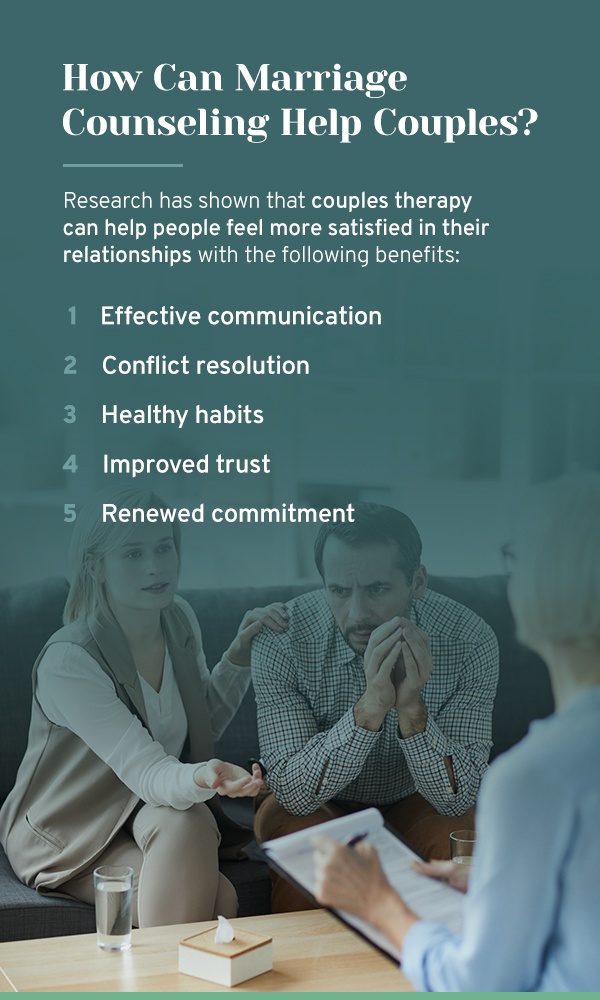
- Effective communication: A breakdown in communication can happen in any relationship. Marriage counseling can help you and your partner rebuild effective communication during your sessions and outside of them. The mutual sharing of thoughts and feelings and being heard can help improve and deepen a relationship.
- Conflict resolution: Conflict is a common reason that couples decide to seek counseling. It can be easy to fall into a pattern of arguing without considering the other person’s perspective. Marriage counseling can help couples break down a conflict and work toward a solution together.
- Healthy habits: Conflict is likely to arise in the future, but marriage counseling can help you and your partner build healthy habits for addressing and moving past conflict.
- Improved trust: Trust is essential to a strong marriage. Whether that trust has faded or been damaged, you and your partner can find ways to rebuild it with the help of marriage counseling.
- Renewed commitment: The ultimate goal of marriage counseling is to help couples feel secure and satisfied in their relationships. As you work with your partner through the process of counseling, you may find that you are closer than ever before.
Couples of all kinds have the potential to benefit from marriage counseling, but it is important that both partners are committed to the process. If one or both partners are disengaged from the process, marriage counseling is not likely to have as strong of a positive effect on the relationship as possible.
What Can You Expect During a Marriage Counseling Session?
What to expect from marriage counseling can depend on your therapist’s approach, the issues you want to address and how much work you and your partner are willing to do. During your session, your therapist might:
- Allow time to get used to the process: The first counseling session may be more about letting your counselor get to know you and introducing you to the process. Your counselor may even request individual sessions for each partner before diving into the process as a couple. You and your partner may find it difficult to open up to your counselor. It is important to be patient and allow yourself time to become comfortable with the work done in your counseling sessions.
- Encourage honest, open discussion: Your therapist is likely to ask you and your partner to be open and honest during your sessions. If disagreements do arise during therapy, your counselor will be there to help you work through them in a productive fashion. While you might worry about your counselor choosing sides, remember they are there to help you and your partner be on the same team working toward the goal of improving your relationship.
- Ask you to do work outside of your sessions: Going to your counseling sessions is important, but some of the most vital work you will do during this process is outside of the counselor’s office. Your therapist could ask you to try some exercises at home, such as setting aside time each day to listen to each person without interruption.
How you and your partner experience therapy will probably be unique to your relationship. Keep the following in mind:
- Counseling takes time: The problems you are hoping to solve during marriage counseling are likely not going to disappear after one or two sessions. More likely, you will need to focus on the skills you learn during counseling to work through those problems with your partner over time. You may find that you only need therapy for a certain amount of time.
- You might need more care: Some couples may discover that issues that come up during marriage counseling require evaluation and treatment by other health care professionals. For example, mental health issues may require a multidisciplinary approach to treatment.
How Should You Prepare for a Marriage Counseling Session?
Even if you have no experience with counseling, there are a few things you can do to prepare for your sessions:
- Consider your goals: What do you want to get out of marriage counseling? Your therapist can provide guidance during your sessions, but they will want to know why you decided to try therapy and what you and your partner hope to achieve. Before each session, think of a few goals. As you attend follow-up sessions, think of what progress you have made on those goals.
- Talk to your partner: You will be talking to your partner during counseling, but it is a good idea to have a conversation about therapy before you attend your first session. Do you both want to try therapy? Do you have any shared goals? Are there particular issues you both want to discuss with your counselor?
- Prepare some questions for your therapist: Finding a therapist that is a good fit for you and your partner is important. Feel free to ask your therapist some questions about their training and their approach. If you find that you do not mesh with your therapist, it is fine to try someone different. You and your partner should feel comfortable during this process.
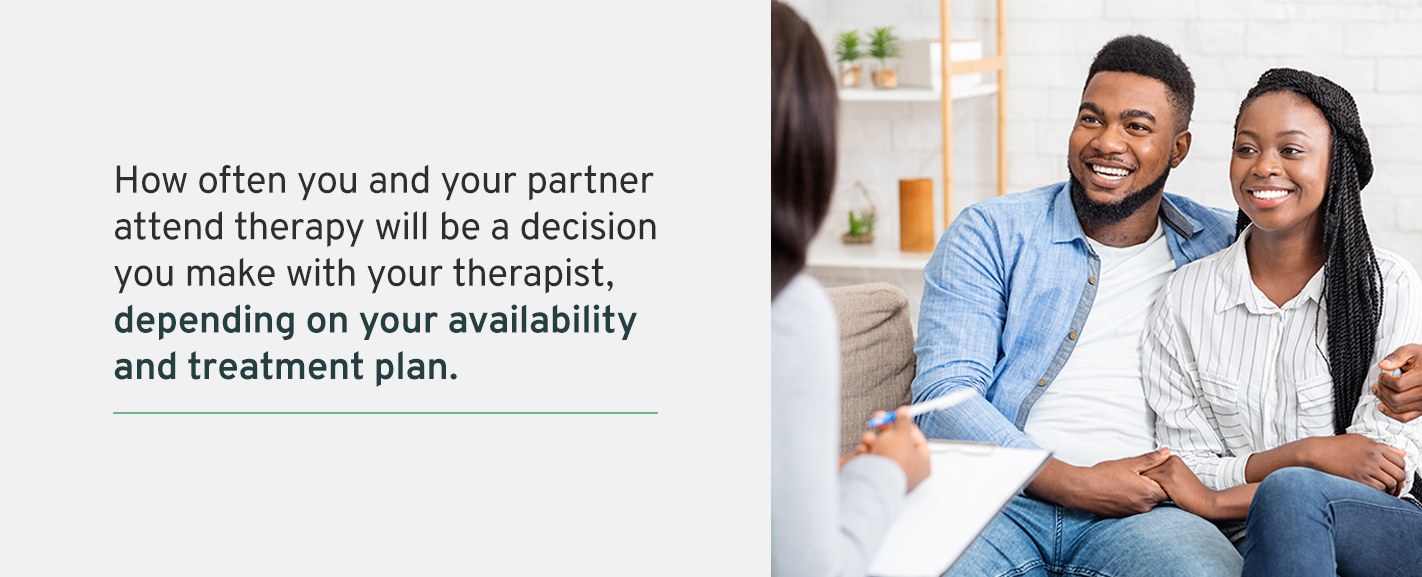
How Long Does Marriage Counseling Take?
A marriage counseling session will usually last about an hour. How often you and your partner attend therapy will be a decision you make with your therapist, depending on your availability and treatment plan.
How long you continue scheduling sessions will differ depending on the couple. Some people seek therapy to resolve one specific issue that can be addressed in just a few sessions. Other couples undergo therapy for an extended period of time to work through multiple complex issues. It is also possible that you will revisit therapy periodically throughout your relationship.
What Do You and Your Partner Need to Do Outside of Your Counseling Sessions?
Marriage counseling sessions are scheduled at regular intervals or as needed, but the work rarely starts and stops with your scheduled time. Your therapist will probably talk to you about different couples therapy exercises and ask you to try some of those exercises together at home, keeping in mind the skills you learn during counseling. Some exercises might include:
- Quality time: Your therapist might ask you and your partner to set aside quality time to spend with one another. That might look like scheduling a weekly or monthly date night, whatever will work with both of your busy schedules. It might mean setting aside all devices for a few minutes before bed and just enjoying one another’s company free from distraction.
- Questions: It might feel like a silly game, but your therapist might ask you to come up with icebreaker questions for one another. The questions can be something simple or something more in-depth, but the answers might surprise you and your partner, sparking more conversation.
- Honest discussion: Honesty in a marriage can be tough. Maybe you want to spare the other person’s feelings. Maybe your partner doesn’t feel like they can be honest without starting a fight. Whatever the case, your therapist could recommend setting aside time for honest conversation, allowing each person to speak openly while the other listens.
Should We Still Seek Therapy When Things Are Going Well?
When to discontinue therapy is ultimately up to you and your partner. If you feel that your relationship is in a solid place, talk to your therapist. Ask them if continuing therapy makes sense. You do not have to feel pressured to quit therapy at any point. For some couples, counseling sessions carve out time to check in on their relationship and spend quality time together. If you feel that way, you can continue therapy as a way to keep the solid foundation you feel you have built for your relationship.
How Do You Find the Right Marriage Counselor for You and Your Partner?
Finding a marriage counselor who is a good fit for you and your partner is an essential part of the process. If you do not like or trust your counselor, therapy is not going to be very effective. Spend some time finding the right marriage counselor with these tips:
- Check credentials: Marriage counselors are specifically trained in their field. Ask about their education. If the person did not train to become a marriage counselor, they may not be the best choice.
- Ask about experience and approach: Once you have found a qualified counselor, you will want to get to know them. Ask questions about their experience with other couples and how they approach treatment. Are they prepared to work with you and your partner to find solutions to challenging issues?
- Don’t be afraid to switch: If you find that you or your partner does not feel supported and respected by a therapist, you can always switch therapists. It may take time, but finding the right fit will help you and your partner gain the most value from marriage counseling.
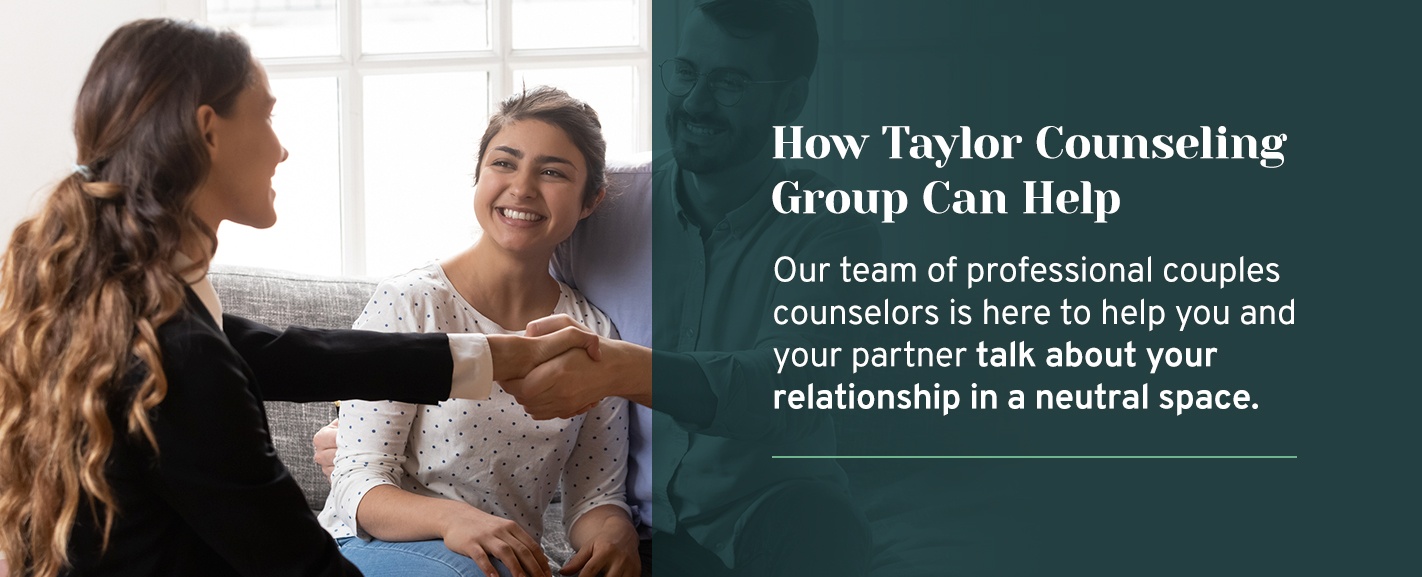
How Taylor Counseling Group Can Help
Taylor Counseling Group offers affordable relationship counseling. Our team of professional couples counselors is here to help you and your partner talk about your relationship in a neutral space. We help couples recognize the unhelpful patterns in their relationships and give them the tools to build a stronger bond. When you are ready, contact us to book your first session.


